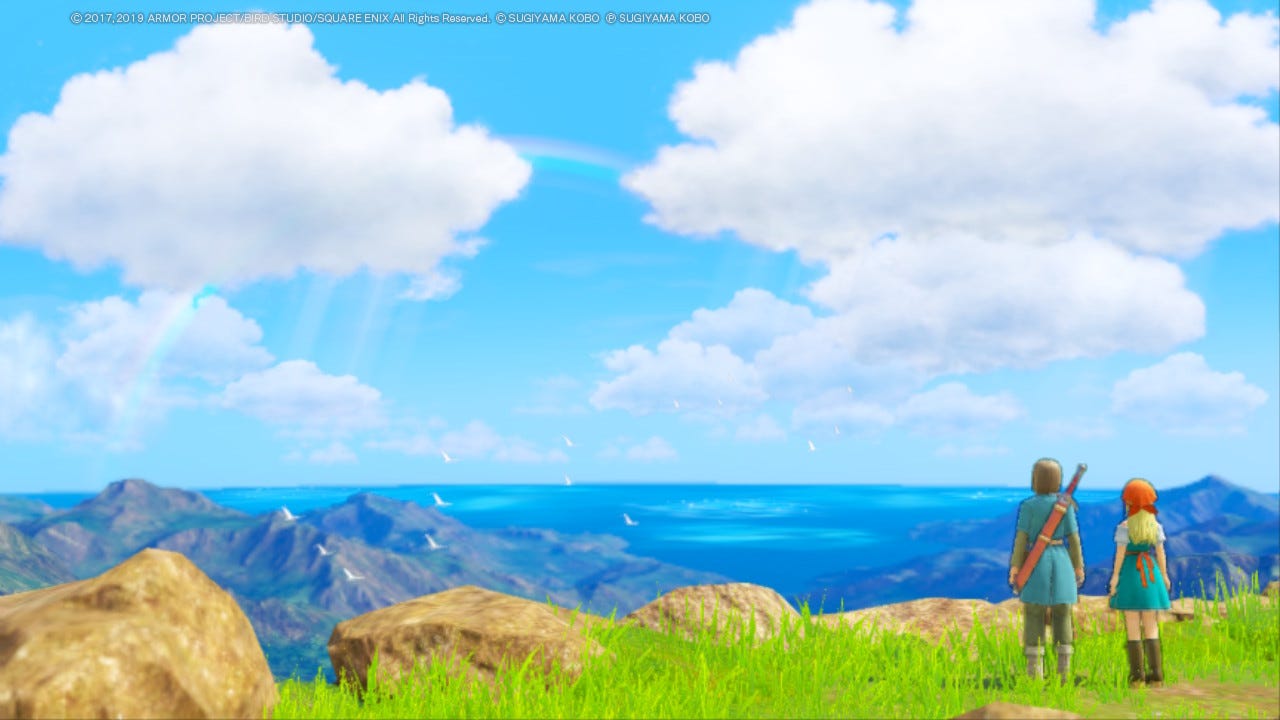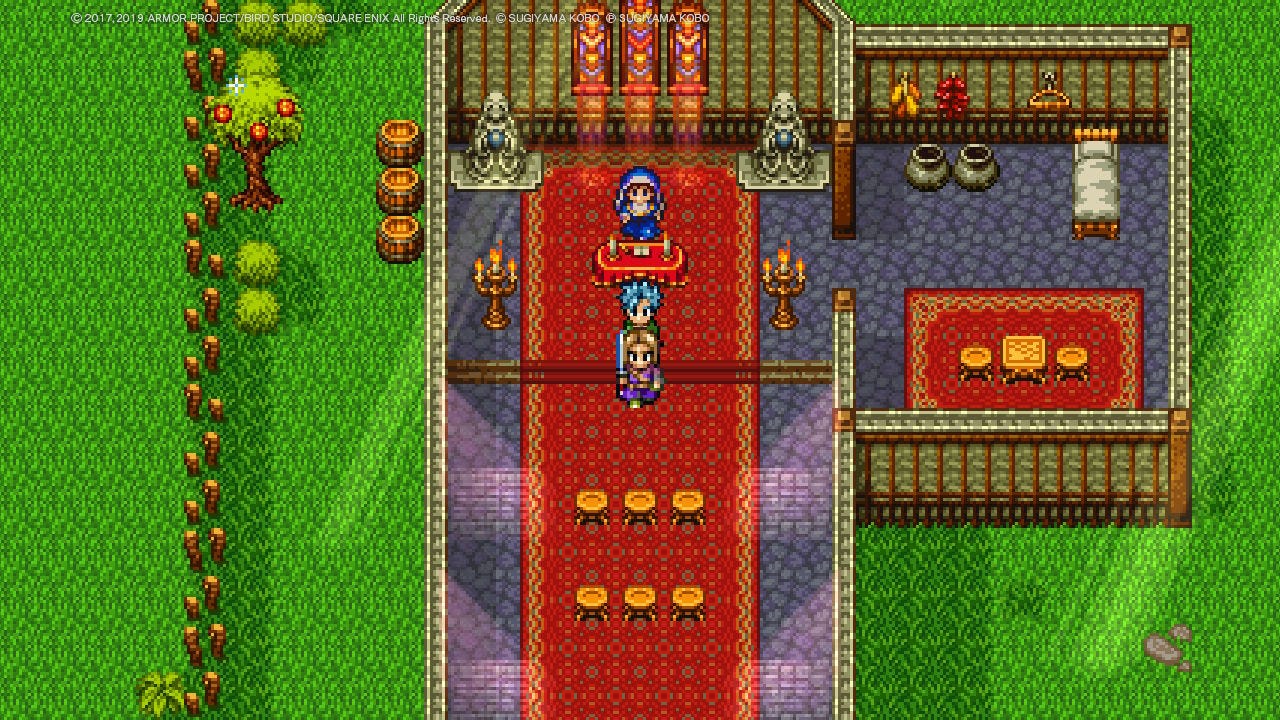Gaming: Dragon Quest XI: Echoes of an Elusive Age
I’ve been playing this one for quite a long time, because… it’s a very big adventure. So I thought it’d be fitting for my first review on this site.
So, today, I’ll break down each component, and give my overall opinions as we go.
Let’s jump right in to it.
Platform: Switch
Developer: Square Enix
Released: September 2019
Gameplay
Arguably, at least in my opinion, one of the most important parts of any experience. And DQ11 does not disappoint.
In terms of the main bulk of the exploration, you have an evolution of the standard JRPG field formula, you run around, you can sprint, and you can jump. Nothing too special there, but DQ11 refines it all, so it feels fluid and smooth the entire time.

Then we include the unique addition of mountable enemies that can be found spread throughout the expansive world, enabling wider exploration and cleverly hidden secrets (e.g. finding a Drake that has flight, and using it to scour the skies of the region for hidden chests), it creates quite the delightful adventure.

Then, we move on to the combat system, and much like almost every aspect of DQ11 as a whole, it’s an iteration and improvement over what has been seen previously in the series. It returns to the standard JRPG turn-based formula, where each character takes their actions consecutively, but where it differs from the previous games is how the turns are organised. Previously, you’d input your entire teams turns all in one shot, then you’d have to sit through and watch every participants actions play out before you can make any more decisions. And while that system is functional, it can be tedious, and restricts some of the strategy, unless you know beforehand the values that determine who’s actions will trigger first, like hoping your healer goes before the enemy action. DQ11 mixes it up with a more dynamic turn-based system, closer to what’s seen in Bravely Default 2, Octopath Traveller, etc, where instead, you input each characters actions individually, they act on that, and then the next persons turn comes up. This makes strategy much easier, and because DQ11 can become quite difficult, strategy is important here. In most other ways, the battle system is very traditional, you have your different weapon types, 8 different characters with their own unique abilities and fighting styles, and the ability to switch out characters in the midst of battle, it all feels like a familiar experience, but refined to feel modern and slick.

Outside of the exploration and combat, there are a few other mechanics along the way. Returning from previous entries in the series is the crafting system. Previously called Alchemy, now it takes the form of the Fun-sized Forge, which allows you to combine equipment and resources to craft even more powerful gear, and it’ll be important, because some of the most powerful equipment available is only found through this. That familiar theme of “familiar but refined” is also applied here though, as the hunting for resources is far easier, as you can very easily view where missing materials can be found, right there in the crafting window, and in the case of common materials, you can buy the missing materials for a set cost of gold from right there in the same window.
Also returning from previous entries is a wide variety of character customisation. You have the skill trees which let you decide how each character develops, such as building the thief to use Swords, or Knives, or Boomerangs, plus a unique skill tree for each character which contains improvements and buffs that carry over across each different build. One improvement to this system over what was seen in DQ8 though, is the ability to, at any time from a save point, for a small cost of gold that scales up with your level, but never feels like it becomes too much, is the ability to reset your characters skills, returning *all* spent skill points, allowing you to respec your builds depending on what you need, or to correct any mistakes.

Another small but welcome addition, is a minor but nifty cosmetics system where some equipment can change your appearance. But you don’t need to keep swapping around gear to define you’re looks, no no. Once you have owned a piece of equipment that has a cosmetic component once, even once it is sold or discarded, you can apply that look again at any time.
The game also includes a lot of convenience improvements over the previous entries, like a clear map showing everything available in the area, a comprehensive fast travel system, auto-saves, a fairly solid photo mode, and on-field encounters instead of random encounters.

Included is also an expansive quest system, where characters in the world have optional quests for the party, which can give high level unique equipment, resources, or just apply permanent passive buffs to the characters.
Overall, DQ11 plays like you’d expect a traditional JRPG to feel like, but refined and modernised to the point of it feeling like the definitive version of each of these components.
Rating: 10/10
Graphics

The usual art style of DQ returns, but thanks to the Unreal engine and some very slick design, it looks absolutely amazing, even on the Switch, I still view it as one of the best looking Switch games I’ve ever seen.
Every character looks unique and interesting, the environments feel real and expansive, animations are slick and smooth, it all feels like an incredible amount of polish and refinement went in to every aspect of the world.
Even down to the monsters in battle, which include many familiar and new designs, everything looks great. Seeing monsters I’d only ever seen in PS2 or earlier generation entries now being realised in full HD was definitely exciting for a long-time fan of the series.
Rating: 10/10
Audio
Like with the graphics, the soundtrack is very familiar to anyone who’s been with the series. While there is entirely new tracks, the vibe and the feel of it all is very much as it has always been.
And while most of the tracks are solid, I do feel a lack of “epic” tracks, especially in fierce boss fights, which still keep a lighthearted and bouncy feel.
The sound effects are also very familiar, a lot of the traditional interface sounds, monster noises, which help to keep the very up-beat theme.
The voice cast is also quite high quality. Most of the voices of the main cast do a very good job, having interesting and memorable line reads with enough emotion to keep it all interesting to listen through even at the 80 hour mark.
Rating: 8/10
Story
The story is not the most groundbreaking, also feels very familiar to what has been seen before in the series, but with enough twists and turns to keep things interesting.
The main story is a packed adventure, it takes quite a while to get through, because so much detail is put in to everything, the cutscenes and dialog are delightful, and the pacing always feels quick enough to where things don’t outstay their welcome. The story also follows a similar structure to DQ7/8, where you have an initial main adventure around the world with one story arc, then after some big twists and turns, a second arc begins where the world is different and more dangerous, and a second adventure begins. But since DQ11 specialises in just being bigger and better, it also includes a third act, with even more challenges, and further expanding the story and history of the world.
Every character also has their own time to shine, with sections of the story dedicated to their part in the adventure, as well as the myriad of side stories which further expand their character.
And of course, as is standard with the DQ series, most NPC names and character names are humorous and involve some clever wordplay, which helps bring a lighthearted feel to even the most dire situations.
Story: 9/10
Extras
DQ11 features a lot of additional features and goodies. One neat feature is the inclusion of an entirely alternate 2D perspective, which allows you to play through the entirety of DQ11, but in the perspective and art style of earlier DQ entries, including the original battle system. So yes, if DQ11 wasn’t big enough already, they also essentially made the same game twice in two different play styles.
Final Thoughts
DQ11 is a colossal adventure, even without doing all of the side quests and completionist stuff (42/89 quests completed, 432/740 monsters encountered), and still not even finished with the third arc (Still 2 thirds of an endgame dungeon to do, and many side stories and bosses still left to complete), my current play time at the time of writing this is 80 hours. By far, one of the biggest and most expansive JRPG’s I’ve ever seen. The fact that they could pack so much content in such a beautiful package on a cartridge continues to impress me.
Overall, DQ11 has quickly become one of my favourite JRPG’s of all time, and my favourite of the entire franchise, and I would recommend it to any fan of JRPG’s, but also because of it’s systems being designed for convenience and simplicity, while still allowing for complexity, and with an interesting and engaging world, it’s also fitting for a first entry in to the genre.
Total: 37/40








